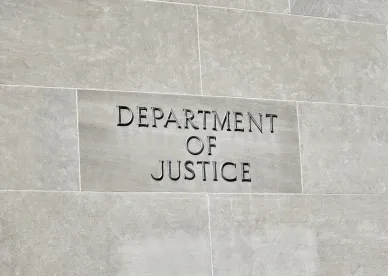As COVID-19 continues to ravage the United States, the Department of Justice (DOJ) has recently announced its new National Rapid Response Strike Force within the Health Care Fraud Unit to investigate and prosecute fraud cases involving major health care providers that operate in multiple jurisdictions. The newly created Strike Force will focus on the investigation and prosecution of individuals and corporations, and cases like the large-scale rural hospitals billing fraud matter indicted in the Middle District of Florida and the global resolution with Tenet Healthcare Corporation and related individual prosecutions will be within the purview of the Strike Force. Those cases involve a range of alleged violations of federal statutes, including healthcare fraud, conspiracy, and the Anti-Kickback Statute. The Strike Force relies on data analytics to target fraudulent activities, as opposed to the traditional reliance on whistleblowers and qui tam actions in the health care arena. Additionally, the Strike Force is based in Washington, D.C., with experienced investigators and prosecutors enabling the Strike Force to act quickly and take the burden away from local U.S. Attorneys’ offices that are inundated with complaints of COVID-related fraud.
The Strike Force will also handle the prosecutions of those seeking to criminally exploit the COVID-19 pandemic through health care fraud and related financial fraud schemes. The Strike Force will handle criminal cases like the case recently brought against a North Carolina man who fraudulently sought over $6 million in Paycheck Protection Program (PPP) loans for several entities. His PPP loan applications were supported by false statements about the companies’ employees and payroll expenses, and fake documents, including falsified tax filings. Charges, in that case, included wire fraud, bank fraud, and engaging in unlawful monetary transactions. The case was investigated by the U.S. Treasury Inspector General for Tax Administration, the FDIC Office of Inspector General (OIG), and the FBI, with the assistance of the Small Business Administration OIG.
This is not the only example of a criminal case swiftly investigated and indicted in recent months specifically targeting those trying to exploit PPP loans and other COVID-related relief programs. In Texas, a woman was charged after receiving more than $1.9 million in PPP loans on behalf of two entities that neither had employees nor paid wages consistent with the amounts claimed in the loan applications. A National Football League player in Florida was indicted for his participation in a conspiracy to obtain more than $24 million in PPP loans, using more than $104,000 of the proceeds from the fraudulent loans to purchase luxury goods from Dior, Gucci, and jewelers. Two brothers in New York were charged with wire fraud conspiracy after submitting at least eight fraudulent loan applications in an attempt to obtain nearly $7 million in PPP loans. These examples are an indication of the explosion of criminal prosecutions related to the disbursement of COVID relief funds that is sure to come in the near future.
Along with criminal prosecutions, an increase in COVID-related civil enforcement actions is also to be expected with the creation of the Strike Force. For example, the DOJ has used enforcement actions to shut down more than 300 websites that fraudulently purported to sell products that became scarce during the pandemic, including hand sanitizer and disinfectant wipes. Thousands of victims throughout the United States paid for items through these websites but never received them. The DOJ also reported having received more than 3,600 complaints about COVID-related online scams less than two months into the declared pandemic, which will certainly result in additional civil enforcement actions.
The broad array of investigative agencies involved in the cases brought thus far demonstrates the vast resources available to the Fraud Section in conducting these investigations. These investigations are not just run by the well-known federal investigative agencies, such as the FBI, Secret Service, and IRS, but also include lesser-known, but equally aggressive investigative agencies like the FDIC-OIG, Board of Governors of the Federal Reserve, Small Business Administration OIG, Bureau of Consumer Financial Protection OIG, the Federal Housing Finance Agency OIG, and the U.S. Treasury Inspector for Tax Administration. The participation of such a large number of investigative agencies is reminiscent of the federal government’s response to prior crises, such as the financial crisis of 2008, and portends significant enforcement activity by the Fraud Section.
With the continued distribution of CARES Act funding as a part of the response to COVID-19, the number and scope of investigations conducted by this newly formed Strike Force will undoubtedly grow. All recipients of CARES Act or other COVID-19 relief funds should be aware of the increasing focus of the DOJ on COVID-related fraud, and both in-house and outside counsel should stay aware of the requirements for compliance in properly utilizing these funds.




 />i
/>i

